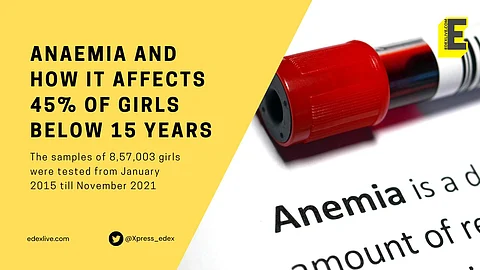

Below the age of 15 years, 46 per cent of the girls are anaemic in India. This Data Analytics Report was based on tests conducted on haemoglobin samples that were received from January 2015 till November 2021. Moreover, 13 per cent of the samples tested were found to be severely anaemic.
In a span of seven years, samples of as many as 8,57,003 girls were tested by SRL Diagnostics, as per a report in ANI.
As per the National Family Health Survey (NFHS)-(III), 55 per cent of the adolescent girls in India are anaemic and when compared to other countries, the prevalence of anaemia across all groups is higher in India.
Anaemia, the world's most prevalent nutritional deficiency disorder, is a condition where one lacks enough circulating red blood cells (haemoglobin) to carry adequate oxygen to your body's tissues.
"In India, severe anaemia prevalence tends to be less than 3 per cent, moderate ranges from 5 to 20 per cent and mild from 25 to 44 per cent," the report stated, as per ANI.
When a zone-wise analysis was conducted, it was revealed that the highest percentage of anaemia, up to 70 per cent, was found in the East zone. When it comes to the trends among all age groups in the different zones, it was found to be more or less similar other than the age group of 12 to 14.9 in East and in the South zone, the percentage of mild anaemia was either more or similar to moderate anaemia.
Speaking on the data study, Anand K, CEO, SRL Diagnostics, said, "Prevalence of anaemia in all the groups is higher in India as compared to other developing countries. Mitigating anaemia in India needs a multi-level approach that includes a high level of awareness building, behaviour change communication and challenging societal norms related to women nutrition and health needs."
